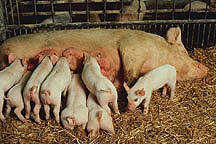This page has been archived and is being provided for reference purposes only. The page is no longer being updated, and therefore, links on the page may be invalid.
| Read the magazine story to find out more. |
|
|
|
|
Ongoing Research Analyzes Formulas, Mother's Milk
By Marcia WoodJanuary 19, 2012
Soy-based baby formula nourishes millions of America's infants. Now, U.S. Department of Agriculture (USDA)-funded scientist Jin-Ran Chen is taking a close look at the effects that soy formula, cow's-milk formula, and mother's milk have on bone development in infants.
Very little is known about the short- and long-term effects of soy formula on bone health, according to Chen. A series of studies, conducted by Chen and his co-researchers, are helping to fill in the knowledge gap.
One early investigation provided a comprehensive comparison of bone formation in piglets that were fed either sow's milk or formulas based on either soy or cow's milk. The scientists chose pigs as the animal model because the pig digestive system is generally regarded as being closest to that of humans, Chen noted.
For this investigation, one of the most detailed of its kind, Chen's team used a range of leading-edge technologies to examine more than a half-dozen well-established indicators of bone quality and quantity (mass).
In general, the work suggests that soy-formula-fed piglets may have the best quality bone, and that soy may enhance bone formation by directly affecting the BMP2 (short for "bone morphogenesis protein") signaling pathway.
Signaling, or messaging, initiated by BMP2 is essential for building and reforming of bone. Though scientists have known of the existence of a BMP2 signaling pathway for several decades, details are still being uncovered. Chen's study was the first to spotlight soy's relative influence on initiating BMP2 signaling.
The findings, published in the Journal of Nutrition in 2009, have helped shape Chen's ongoing animal-model studies of the three feeding options.
Chen is lead scientist for the Skeletal Development Laboratory at the Arkansas Children's Nutrition Center in Little Rock. The Nutrition Center is a partnership of Arkansas Children's Hospital, the University of Arkansas for Medical Sciences, and the Agricultural Research Service (ARS), USDA's chief intramural scientific research agency.
According to nutrition center director Thomas M. Badger, findings from the center's studies are improving the understanding of early nutrition choices, including breastfeeding, the option recommended by the American Academy of Pediatrics.
Read more about this research in the January 2012 issue of Agricultural Research magazine. The research supports the USDA priority of improving children's health and nutrition.

